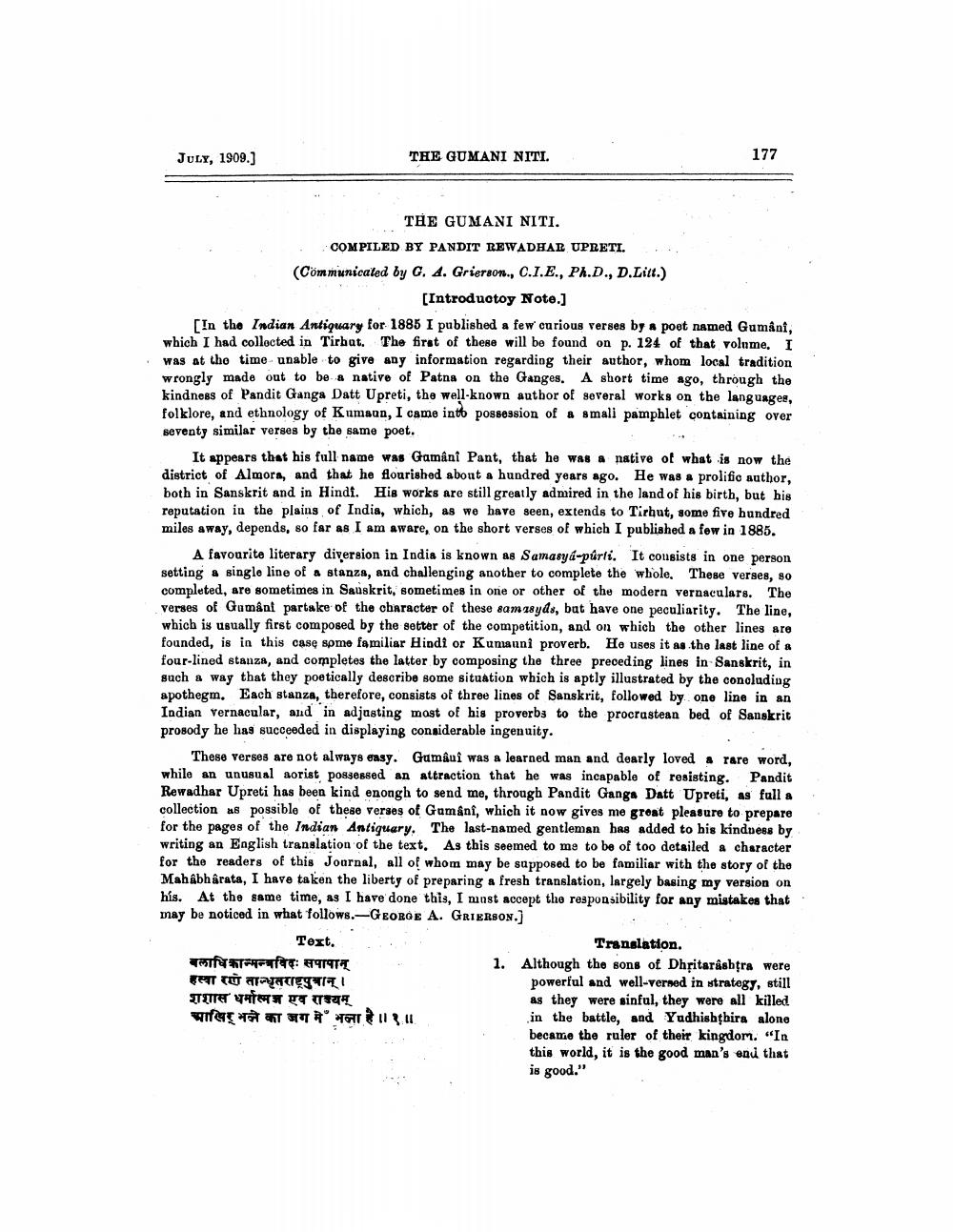________________
JULY, 1909.)
THE GUMANI NITI.
177
THE GUMANI NITI. COMPILED BY PANDIT REWADHAL UPRETI. (Communicated by G. A. Grierson., C.I.E., Ph.D., D.Litt.)
[Introduotoy Note.) In the Indian Antiquary for 1885 I published a few curious verses by a poet named Gumani, which I had collocted in Tirhat. The first of these will be found on p. 124 of that volume, I was at the time unable to give any information regarding their author, whom local tradition wrongly made out to be a native of Patns on the Ganges. A short time ago, through the kindness of Pandit Ganga Datt Upreti, the well-known author of several works on the languages, folklore, and ethnology of Kumaun, I came into possession of a smali pamphlet containing over seventy similar verses by the same poet.
It appears that his full name was Gamâni Pant, that he was a native of what is now the district of Almora, and that he flourished about a hundred years ago. He was a prolific author, both in Sanskrit and in Hindi. His works are still greatly admired in the land of his birth, but his reputation in the plains of India, which, as we have seen, extends to Tirhut, some five hundred miles away, depends, so far as I am aware, on the short verses of which I published a fow in 1885.
A favourite literary diversion in India is known as Samasya-púrli. It consists in one person setting a single line of a stanza, and challenging another to complete the whole. These verses, so completed, are sometimes in Sauskrit, sometimes in one or other of the modern vernaculars. The verses of Gamânt partake of the character of these sam 18yds, but have one peculiarity. The line, which is usually first composed by the setter of the competition, and on which the other lines are founded, is in this case spme familiar Hindi or Kumauni proverb. He uses it as the last line of a four-lined stanza, and completes the latter by composing the three preceding lines in Sanskrit, in such a way that they poetically describe some situation which is aptly illustrated by the concluding apothegm. Each stanza, therefore, consists of three lines of Sanskrit, followed by one line in an Indian vernacular, and in adjusting most of his proverbs to the procrastean bed of Sanskrit prosody he has succeeded in displaying considerable ingenuity.
These verses are not always easy. Gamaui was a learned man and dearly loved a rare word, while an unusual aorist possessed an attraction that he was incapable of resisting. Pandit Rewadhar Upreti has been kind enongh to send me, through Pandit Ganga Datt Upreti, as fall a collection as possible of these verses of Gamânî, which it now gives me great pleasure to prepare for the pages of the Indian Antiquary. The last-named gentleman has added to his kindness by writing an English translation of the text. As this seemed to me to be of too detailed a character for the readers of this Journal, all of whom may be supposed to be familiar with the story of the Mahabharata, I have taken the liberty of preparing a fresh translation, largely basing my version on hís. At the same time, as I have done this, I must accept the responsibility for any mistakes that may be noticed in what follows.-GEORGE A. GRIERSON.] Text.
Translation. बलाधिकान्मन्बाविदः सपापान्
1. Although the sons of Dhțitarashtra were हस्खा रणे तान्धृतराष्ट्रपुबान्।
powerful and well-versed in strategy, still शशास धर्मात्मा एव राज्यम्
as they were sinful, they were all killed wie TT 13.41
in the battle, and Yudhishthira alone became the ruler of their kingdom. "In this world, it is the good man's end that is good."




